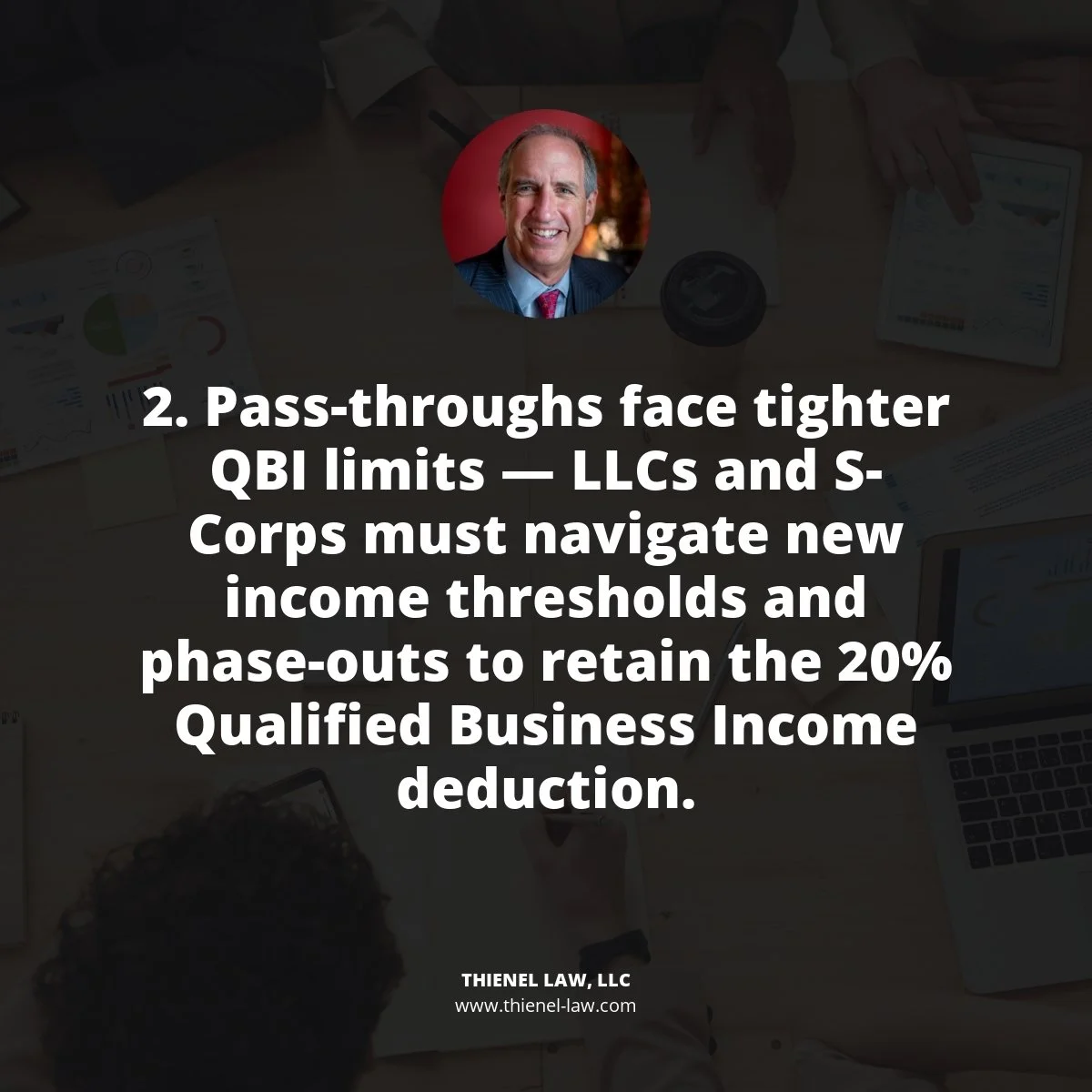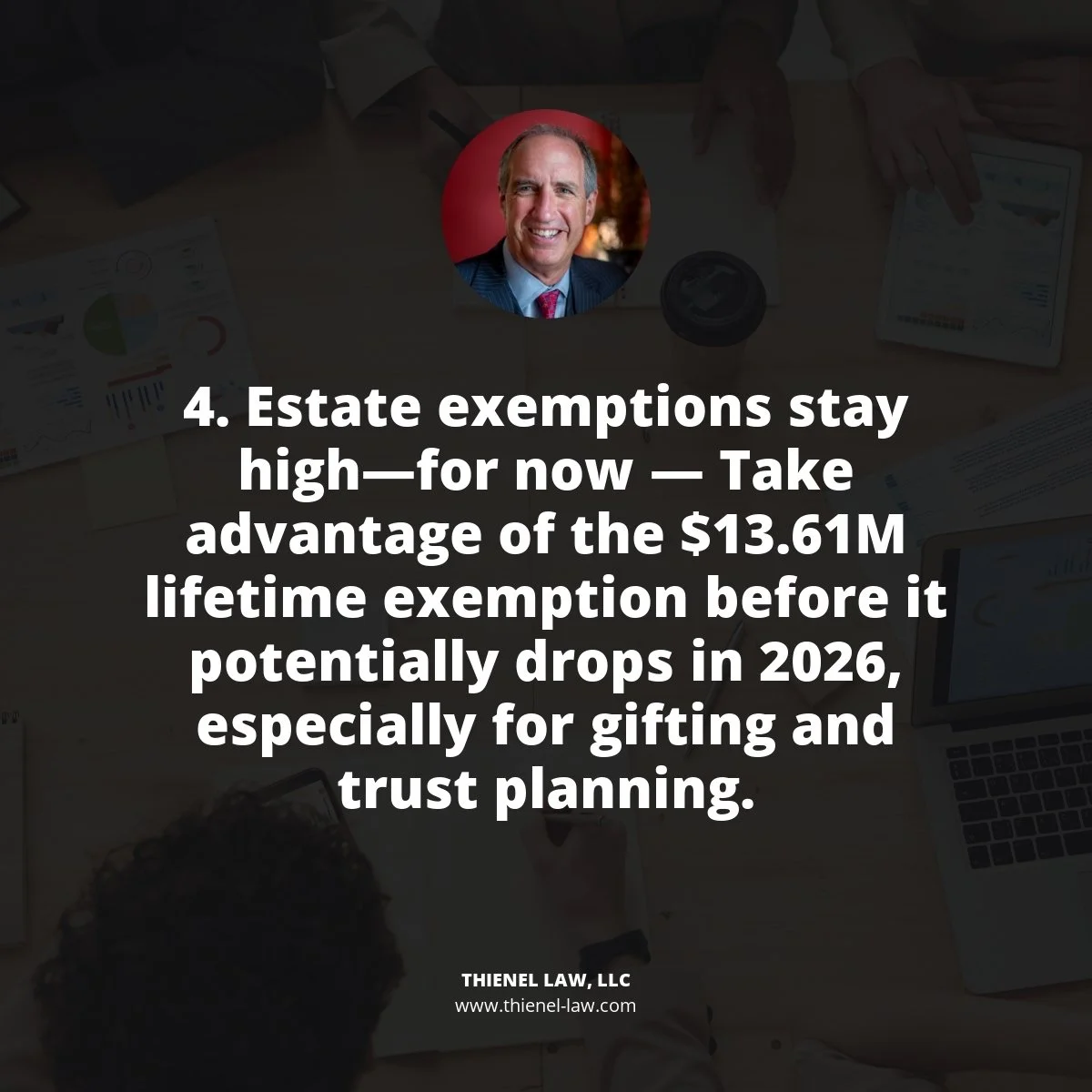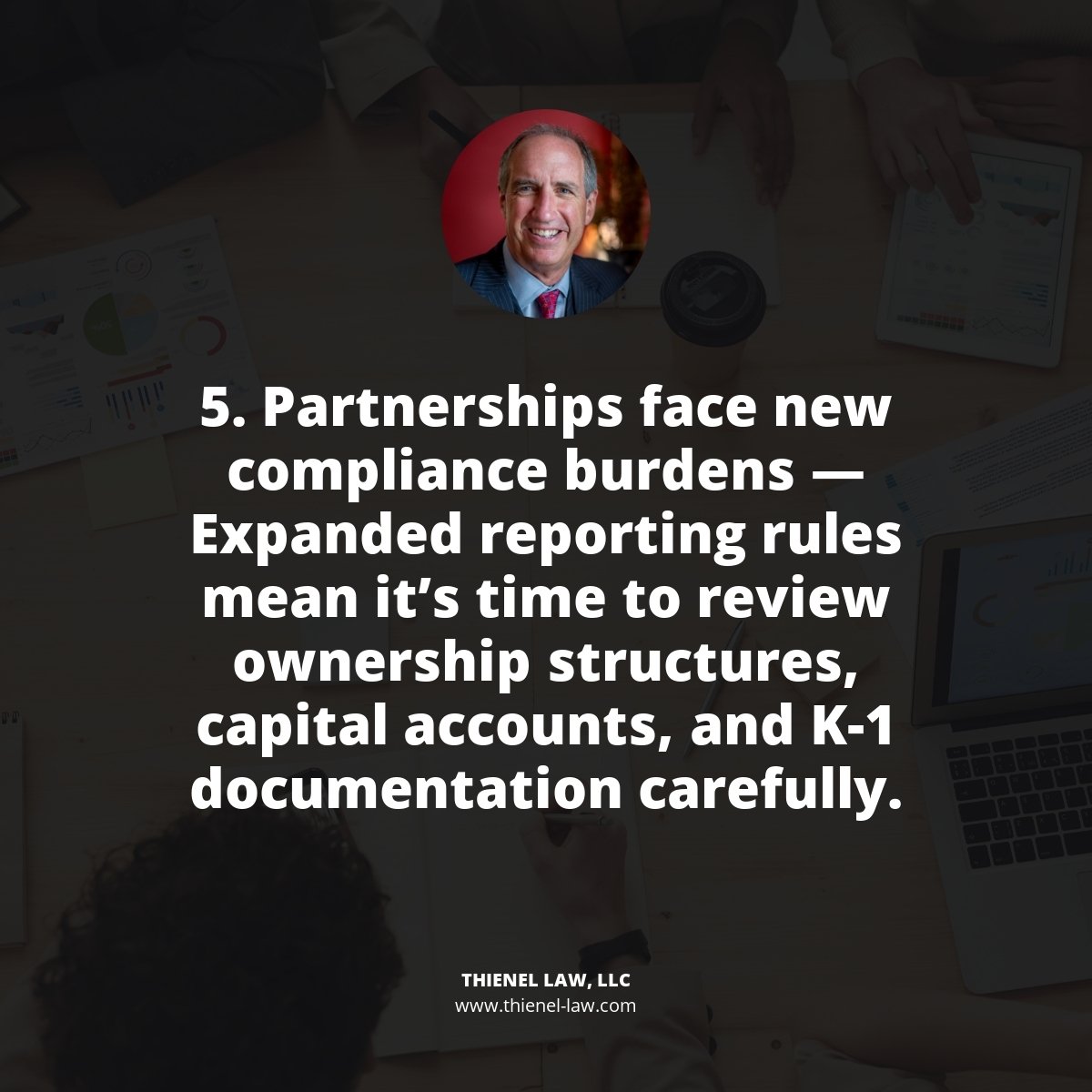What the 'One Big Beautiful Bill' Means for Your Business and Taxes in 2025
The federal tax code just changed—again. The "One Big Beautiful Bill" has officially been signed into law, promising sweeping modifications to the U.S. tax structure. Whether you're a small business owner in Bethesda, a partner in a D.C. law firm, or a high-net-worth investor in Arlington, these changes could impact your bottom line.
Below, we break down what you need to know about this legislation, how it may affect your business, and what steps you can take now to prepare. As always, the tax attorneys at Thienel Law are ready to help you navigate these changes with clarity and confidence.
Key Takeaways:
The bill lowers tax rates for certain businesses while eliminating or capping several deductions.
High-income individuals lose some loopholes—but gain new planning opportunities.
Pass-through entities like LLCs and S-Corps are affected by changes to the Qualified Business Income deduction.
The bill creates both potential tax savings and new compliance burdens for partnerships.
Estate and gift tax exemptions remain high but face future uncertainty—making proactive planning critical.
Why This Matters to DMV Businesses and High-Net-Worth Individuals
For business owners and professionals in the D.C., Maryland, and Virginia region, federal tax changes often bring a ripple effect across decision-making—from how you compensate yourself to how you structure your enterprises. The "One Big Beautiful Bill" is no exception.
While the bill's full effect will unfold over time, there are immediate implications worth your attention. Some clients will benefit from lower effective tax rates or expanded deductions. Others, particularly those with complex income or entity structures, may find that the math is less favorable.
Understanding how the law applies to your unique situation is the first step to making informed tax and legal decisions in 2024 and beyond.
Lower Corporate Tax Rates—But With Caveats
One of the headline provisions in the new law is the corporate income tax remaining at 21% under the Tax Cuts and Jobs Act of 2017. Even though the corporate tax rate remains the same, the OBBA references full expensing, advanced manufacturing credits, and paid family leave credit expansion as methods of tax relief for corporations.
However, most small and mid-sized business clients in the DMV aren't structured as C-corporations. Instead, they operate as pass-through entities (like LLCs, partnerships, and S-Corporations), where income passes directly to the owners' personal tax returns.
What's important to understand: While C-corporations see immediate rate reductions, pass-through businesses face a more nuanced impact due to changes in the Qualified Business Income (QBI) deduction.
Example:
A manufacturing company based in Northern Virginia structured as a C-corp may now enjoy a reduced federal tax bill thanks to the 21% flat rate. But an LLC providing professional consulting services will need to reassess whether the QBI deduction remains beneficial under the new law's adjusted income thresholds and phase-outs.
Tighter Rules for the Qualified Business Income Deduction
The bill retains the popular QBI deduction, which allows eligible pass-through business owners to deduct up to 20% of their qualified business income. However, there are now stricter limitations based on income level, business type, and wages paid.
For example, "specified service" businesses—like legal, medical, and accounting practices—will see sharper phase-outs of the deduction. If your household income exceeds a specific level and your business provides personal services, the value of the QBI deduction may be severely curtailed.
Practical Tip:
If you own a service-based business nearing these income thresholds, it may be time to consider restructuring your entity, adjusting compensation, or segmenting service offerings that are subject to different treatment under IRS rules.
High-Earners Face Reduced Deductions—But New Planning Opportunities Emerge
Individual taxpayers earning above $500,000 (or $1 million for married couples filing jointly) will face new caps on itemized deductions, including limits on mortgage interest and state and local tax (SALT) deductions.
While the SALT cap remains controversial in high-income, high-tax areas like Montgomery County or Fairfax, the new law reintroduces a modified AMT (Alternative Minimum Tax), designed to ensure high earners pay a minimum effective tax rate.
However, the law also introduces new opportunities for income shifting, charitable giving, and investment-based tax strategies:
Special tax treatment for investments held over 3 years, favoring long-term capital appreciation.
The law tightens certain deductions, but does not provide a new 70% AGI charitable cap.
Deferred taxation opportunities through qualified opportunity zone reinvestments.
Example:
A couple living in Washington, D.C., earning over $1 million annually with real estate holdings and a private foundation may benefit from adjusting their giving schedule and exploring opportunity zone investments to offset the impact of deduction limits.
Estate Planning Grows More Urgent: High Exemption, Uncertain Future
The bill leaves intact the historically high federal estate and gift tax exemption—currently $13.61 million per individual (or $27.22 million per married couple). However, these levels are set to sunset after 2025 if Congress does not act, returning the exemption to pre-2018 levels.
The current law presents a closing window for tax-efficient wealth transfers through:
Lifetime gifting strategies.
Trust planning (such as Spousal Lifetime Access Trusts or SLATs).
Use of valuation discounts for closely held business interests.
We encourage high-net-worth families and business owners to act early. Waiting until the exemption is reduced could mean millions in avoidable estate taxes.
New Compliance Rules for Partnerships and S-Corps
While pass-throughs didn't get the same headline reductions as C-corporations, the bill brings new compliance responsibilities.
Partnerships and S-Corporations are now subject to enhanced information reporting requirements, including:
Disclosure of indirect ownership.
Tracking of at-risk basis and capital accounts.
Annual reporting of high-income partner allocations.
These changes aim to close perceived loopholes used by high-income taxpayers to defer or shield income—but they also add complexity for legitimate businesses with multiple owners or layered entity structures.
Strategy Consideration:
Partnerships operating across Maryland and Virginia with tiered ownership should engage in an entity diagnostic—ensuring their K-1 reporting, operating agreements, and accounting systems are ready for the increased scrutiny.
Risk Management and Strategic Takeaways
We always tell clients: tax isn't just a cost—it's a strategic tool. But to use it properly, your business decisions must be made with tax awareness, not just compliance.
Here are some actions to consider:
Revisit entity structure: Would changing from an LLC to a C-corp, or vice versa, lead to long-term savings?
Review ownership and compensation strategies: Are you paying yourself in ways that trigger unnecessary self-employment taxes or lose out on QBI eligibility?
Analyze capital investments: The bill expands and extends bonus expensing, but could pose several hurdles depending on an individual's financial situation.
Plan for liquidity in trusts: Ensure your estate plan can cover taxes efficiently without needing to liquidate investment or business assets.
Final Thoughts
The "One Big Beautiful Bill" may not simplify our tax code—but it changes the landscape in material ways. For business owners, professionals, and high-net-worth individuals in the DMV area, the bill creates both risks and opportunities.
With the right planning, these changes can work in your favor. But waiting too long to adapt can lead to surprise liabilities or missed tax-saving windows. Whether you need to update your estate plan, reassess your business structure, or model your 2025 tax exposure, now is the time to act.
If you're unsure how this applies to your business or personal situation, we're here to help. Schedule a consultation with attorney Steve Thienel to get practical, customized advice that protects your assets and grows your financial future.






